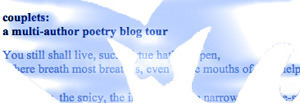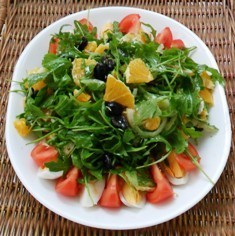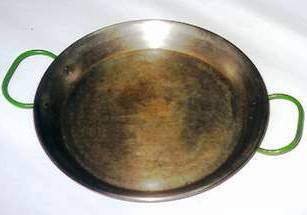Sue Burke's Blog, page 82
April 15, 2012
Couplets: poetry on tour

To celebrate National Poetry Month, Upper Rubber Boot Books is coordinating a poetry blog tour, and today I'm hosting Carol Berg. I've already written about translation from Spanish in another post, and today Carol talks about translation from a Swedish without having mastered the language.
Fifty poets are participating in this tour. You can find links to other Couplets posts at:
http://www.upperrubberboot.com/couplets-a-multi-author-poetry-blog-tour/
Celebrate poetry!
………
On Translation, by Carol Berg
One of the first poems I ever published, "Make Believe," was about my grandfather who lived in Jamestown, New York. My grandfather was Swedish and I never learned how to speak Swedish and always felt that was such a loss. When my family traveled to Jamestown, everything would change, even my father. He would try to speak Swedish to his friends, although he only knew certain phrases. For that reason, and many others, I chose to translate three Swedish contemporary writers for my third semester project while I was getting my MFA in poetry at Stonecoast's Low-Residency program. Translating, I believed, would introduce me to the Swedish language as well as strengthen my own poetry in ways I would probably learn only intuitively.
Clearly, not being fluent in Swedish presented some problems. I needed to find Swedish speakers willing to help me. Being a member of the Wom-po list-serve (a discussion group of women poets), I emailed a request for Swedish speakers and received a number of responses. I also decided to use two different methods of translating. The first was to go through the poem myself and translate it word for word, then use an existing English translation to help in understanding. The other method was to ask a translator for a transliteration of three poems by each of the poets and then to turn these literal translations into poems in English.
The tools I worked with were The Hippocrene Standard Swedish-English Dictionary, Swedish: Essentials of Grammar, as well as an online Swedish dictionary website http://www.ordboken.nu/. In addition, I accessed the Swedish online newspaper SvD and tried to read it often.
I immediately realized how difficult translating is when I began translating Eva Ström's poem "Jag är Steinkind". The first line of the poem, "Jag är Steinkind i min svarta klänning," translates directly to "I am stonechild in my black dress." For me "black dress" conjured the sexy little black cocktail dress and not a funeral dress, which to my mind would be "black clothes." After struggling with the possible meanings and the rest of the poem, I made what I considered my first true translational choice, which was changing the word "klänning" to "cloth" instead of "dress." In my mind, "cloth" sounded similar to "klänning," but the connotations would be different. At the very point of making such a decision, I felt a responsibility for the poem. To read my translation of this and another poem by Ström, go to http://archjournal.wustl.edu/node/288.
One of the ongoing arguments about translation is whether the translator should attempt a translation in a language he or she knows very little about. After my experience, I can honestly say that having a fluent understanding of Swedish may have helped me create better translations. I am thinking mostly of having the connotations of words that could have enabled me to make different choices. But I feel that, especially with the tools now available to a translator, such as hearing the language on the internet, the ease of finding on-line dictionaries — in short, the ability to immerse oneself into the target language from one's own home — makes translation a different process than it has been before.
If you are interested in translating, I would highly suggest asking around in your particular communities first for native speakers, be it an on-line virtual community or one that is in your neighborhood. Buy some dictionaries in your target language. Look for international blogs in another language and visit them daily, without worrying about trying to understand the language. And finally, choose a poem that's relatively short in length.
To hear many many international poets read their poems in the native language, and to find poems written in another language, go to http://lyrikline.org/ and browse around. It's a start to your translating project.
April 12, 2012
Couplets: poetry on tour

It's National Poetry Month. To celebrate, Upper Rubber Boot Books is coordinating a poetry blog tour called Couplets, and today I'm on tour at Christina Nguyen's blog:
http://tina.mnnguyen.com/2012/04/12/featured-couplets-poet-sue-burke/
She and I have written a series of linked hiakus for a year in Minnesota, where she lives, and Spain, where I live.
Fifty poets are participating in this tour. You can find links to other Couplets posts at:
http://www.upperrubberboot.com/couplets-a-multi-author-poetry-blog-tour/
— Sue Burke
April 8, 2012
Celebrate National Poetry Month with Couplets

It's National Poetry Month. To celebrate, Upper Rubber Boot Books is coordinating a book blog tour called Couplets. Fifty poets are participating by hosting guests at their blogs or being guests at other participants' blogs. Here is the list for the first week. Take a look and enjoy!
1 April 2012: what we make waiting for death (Lyn Lifshin at Joanne Merriam).
1 April 2012: National Poetry Month: Guest Post #1, Stella Pierides . . . (at Margaret Dornaus' Haiku-doodle)
1 April 2012: Inquiring Minds and Other Clichés - Neil Aitken (at Christine Klocek-Lim's November Sky Poetry).
1 April 2012: National Poetry Month: Margaret Dornaus (at Stella Pierides: Literature, Art, Culture, Society).
1 April 2012: Gillena Cox (at Angie Werren's feathers: micropoetry (and tinyprose)).
1 April 2012: Kristine Ong Muslim on Arlene Ang's "Living Without Water" (guest post) (at Peg Duthie's zirconium).
2 April 2012: National Poetry Month: Guest Post #2, Jenny Ward Angyal . . . (at Margaret Dornaus' Haiku-doodle)
2 April 2012: Margaret Dornaus (at Angie Werren's feathers: micropoetry (and tinyprose)).
3 April 2012: National Poetry Month: Guest Post #3, Cara Holman . . . (at Margaret Dornaus'< a href="http://haikudoodle.wordpress.com"...)
3 April 2012: Translation in poetry: thorny problems — a guest post by Sue Burke (at Heather Kamins: fiction, poetry, and other necessities)
3 April 2012: Inquiring Minds and Other Clichés - Hannah Stephenson (at Christine Klocek-Lim's November Sky Poetry).
3 April 2012: Couplets: a multi-author poetry blog tour — Marty Smith (at Shiteki Na Usagi [T.A. Smith/Yousei Hime])
3 April 2012: Yousei Hime (at Angie Werren's feathers: micropoetry (and tinyprose)).
3 April 2012: how will we translate ourselves? (Deirdre Dwyer at Joanne Merriam).
4 April 2012: Couplets Blog Tour: Carol Berg Hosts Peg Duthie (at Ophelia Unraveling)
4 April 2012: National Poetry Month: Guest Post #4, Christina Nguyen (at Margaret Dornaus'< a href="http://haikudoodle.wordpress.com"...)
4 April 2012: Start with a number . . . (Sonja deVries, Yael Flusberg, Janine Harrison, Jaime Lee Jarvis, and Margaret Rozga at JoAnne Growney's Intersections --Poetry with Mathematics)
4 April 2012: Featured "Couplets" Poet: Margaret Dornaus (at Christina Nguyen's< a href="http://tina.mnnguyen.com/">A wish for the sky...)
4 April 2012: Christina Nguyen (at Angie Werren's feathers: micropoetry (and tinyprose))
5 April 2012: Poetry of the Urban Pastoral (Celia Lisset Alvarez at Scattered Showers in a Clear Sky: Poetry, Gardening, Birding, and other reflections on life [Anne Higgins])
5 April 2012: National Poetry Month: Guest Post #5, Kirsten Cliff . . . (at Margaret Dornaus'< a href="http://haikudoodle.wordpress.com"...)
5 April 2012: Inquiring Minds and Other Clichés — S. Abbas Raza (at Christine Klocek-Lim's November Sky Poetry).
5 April 2012: National Poetry Month: Lisa J. Cihlar (at Stella Pierides: Literature, Art, Culture, Society).
5 April 2012: Marty Smith (at Angie Werren's feathers: micropoetry (and tinyprose))
5 April 2012: writing is my excuse for being myself (Jenniey Tallman at< a href="http://www.joannemerriam.com/"&g... Merriam).
6 April 2012: Stella Pierides (at Angie Werren's feathers: micropoetry (and tinyprose))
6 April 2012: Don't Wait (Carol Berg at Mary Alexandra Agner)
7 April 2012: "Books teach me to attend to this world" — a guest post by Lynn Domina (at Heather Kamins: fiction, poetry, and other necessities)
7 April 2012: Inquiring Minds and Other Clichés — Ayesha Chatterjee (at Christine Klocek-Lim's November Sky Poetry)
7 April 2012: Deb Scott (at Angie Werren's feathers: micropoetry (and tinyprose))
7 April 2012: The poem itself should tell the reader the melody of itself by way of its combination of words. (Jericho Brown [autoplays music] at Joanne Merriam)
7 April 2012: Introducing Community Activist/Poet/Playwright Bryan Thao Worra (at Wendy's Muse [Wendy Brown-Baez])
April 6, 2012
Salt cod salad

It's Good Friday and time for my holiday special treat: salt cod salad.
Here in Spain, salt cod is considered a delicacy, especially during Lent — and even when Lent is over, it's so good, why stop eating it? I own an entire cookbook devoted to bacalao, as salt cod is called in Spanish, including appetizers, salads, omelets, and fried, baked, and stewed. A legendary restaurant in Lisbon serves salt cod in a different recipe every day of the year, 365 ways.
Here's my recipe for bacalao salad. Salt cod is amazing with oranges and arugula.
salt cod, desalinated, cooked and cooled, in pieces
an orange or two, peeled and cut into pieces
arugula
onion, sliced fine
black olives
a tomato, sliced or diced
olive oil
a little lemon juice
ground pepper
hard boiled eggs, quartered or sliced, if desired
Toss and serve immediately.
— Sue Burke
April 4, 2012
Theory of style
When I was a freshman in college, I read an excerpt of a book by the Spanish writer known as Azorín, which was the pen name of José Martínez Ruiz, (1873-1967). Mario Vargas Llosa has called him "one of the most elegant artisans of our language."
It changed the way I thought about writing.
The excerpt was from a chapter called "Theory of Style" in the book Un Pueblecito: Riofrío de Ávila, published in 1916. It's set in the little town of Riofrío de Ávila and deals with the experiences of the parish priest, Bejarano Galavis. Chapter 4 describes Bejarano's theory of good writing style — really Azorín's:
………
The snow and the water
[...]Look at the whiteness of that mountain snow, so smooth, so clear; look at the transparency of the water in this mountain stream, so clean, so crystalline. Style is this; style is nothing. Style is writing in such a way that those read it think: This is nothing. They think: I can do this.
And yet they — the ones who think they can — nevertheless can't do such a simple thing; this thing which is nothing may be the most difficult, the most laborious, the most complicated of all.
Directly to the things
Bejarano Galavis, in the prologue to his book, puts forth his theory of style. His declarations are categorical. "Clarity," our author says, "is the first quality of style. We do not speak except to make ourselves understood. Style is clear if it immediately conveys the things in it to the listener without making him pause on the words."
Let us retain this fundamental maxim: Directly to the things. Without words that slow us down, hold us back, make the road more difficult, we arrive instantly at the things.[...]
One who isn't an artist, who isn't a great stylist, who hasn't mastered technique, will always fatally tend to dress up his feelings and ideas with annoying accessories and fuss. He'll never understand that a style should not be rejected for being simple. "The quality of simplicity as a point of style isn't a term of contempt but of art."[...]
And the author adds: "Simple style has no less delicacy or precision than the rest." "Of all the defects of style, the most ridiculous is the one called overstuffed."
Obscure style, obscure thought
Everything must be sacrificed to clarity. "Every other circumstance or condition, like purity, measure, elevation, and delicacy, must cede to clarity." Isn't this enough? Well, for the purists, this: "It is better to be censured for grammar than to not be understood."
"It is true that every affectation is reprehensible, but without fear one can affect to be clear." The only excusable affectation is clarity. "It is not enough to make yourself understandable; it is necessary to aspire to be unable to be misunderstood."
Yes, the supreme style is serious and clear. But how to write seriously and clearly if one does not think that way?[...] Here lies the big problem. We are going to give a formula for simplicity. Simplicity, the extremely difficult simplicity, is a question of method. Do this and you will suddenly achieve great style:
Put one thing after the other. Nothing more; this is everything. Haven't you observed the defect of an orator or writer that consists in putting things inside other things by means of parentheses, asides, digressions, and fleeting and incidental considerations?
Well, the opposite is to put things — ideas, sensations — one after the other. "Things should be placed," Bejarano says, "in the order in which they are thought, and given their proper extension."
But the problem ... is in thinking well.
………
— Sue Burke
Also posted at my professional website:
April 3, 2012
Couplets: poetry on tour

It's National Poetry Month. To celebrate, Upper Rubber Boot Books is coordinating a book blog tour, and I'm one of the tourists.
Today, I'm posting at Heather Kamin's blog, where I discuss the thorny problems of translation in poetry, with examples of what works and what doesn't:
http://heatherkamins.com/2012/04/03/translation-in-poetry-thorny-problems-a-guest-post-by-sue-burke/
Fifty poets are participating in this tour. You can find links to their posts at:
http://www.upperrubberboot.com/couplets-a-multi-author-poetry-blog-tour/
This announcement is just the start. More poetry will be coming your way here throughout April at Mount Orégano — and in many other sites. Join the celebration.
— Sue Burke
March 29, 2012
Authentic paella recipe

Today I'm a guest at Jaleta Clegg's blog, The Far Edge of Normal, writing about how to make authentic Spanish paella for her Thursday recipe feature:
http://jaletaclegg.blogspot.com.es/2012/03/thursday-recipe-paella-with-guest-sue.html
— Sue Burke
March 21, 2012
Go Ahead — Write This Story: Villains get all the fun
Patrick Stewart (Jean-Luc Picard) enjoys playing bad guys. Many actors do. Villains do things, they want things, they voice opinions, they make plans. They're fun and interesting. Heroes become boring when they wait for evil and then have no goal in life other than defeating it. Don't wait for evil. Decide what your hero wants, how deeply she wants it, and how far she'll go to get it. Can she grow? What actions will she take? Who might her decisions threaten or offend? Make your hero fun and interesting. If you need an idea for a story, here's a few.
• This is a horror story about a sadistic telephone hotline counselor who tries to ruin the lives of hotline callers.
• This is a story about an alien spy disguised as a presidential campaign reporter who gets discovered by the candidate. Given this year's crop of candidates, this could be real fun.
• This is a story about a father arranging a marriage for his son, but not telling the would-be bride about the family's curse. It's time for a kick-ass heroine.
— Sue Burke
March 20, 2012
A little business: an interview
Dean also has some interesting posts on his blog about what he's learned on his writer's journey.
http://deanswritingtime.blogspot.com/2012/03/blog-ring-of-power-interview-with-sue.html
— Sue Burke
March 19, 2012
Technical aspects of translation
This is part of a series of author interviews by the Blog Ring of Power.
http://ulbrichalmazan.blogspot.com/2012/03/brop-interview-with-sue-burke_19.html
— Sue Burke



